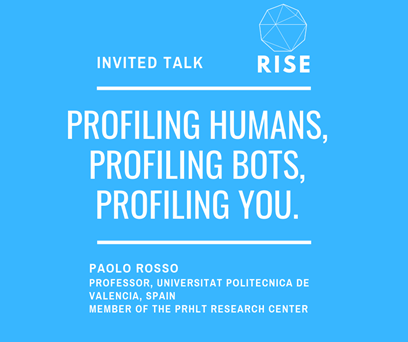Profiling humans, profiling bots, profiling you.

Author profiling studies how language is shared by people. This helps in identifying aspects such as gender, age, native language, or even personality. Author profiling is a problem of growing importance in forensics, security, and marketing. E.g., from a forensic linguistics perspective one would like being able to know the profile of the author of a harassing text message; from a marketing viewpoint, companies may be interested in knowing, on the basis of the analysis of blogs and online product reviews, the demographics of people that like or dislike their products. Our focus will be on author profiling in social media since we are mainly interested in everyday language.
After having addressed since 2013 at the PAN Lab at CLEF (https://pan.webis.de/) several aspects of author profiling in social media (age and gender, personality, language variety, and gender from a multimodal perspective), in 2019 we investigated the feasibility of distinguishing whether the author of a Twitter feed is a bot or a human. In fact, social media bots may influence users with commercial, political or ideological purposes. For example, bots could artificially inflate the popularity of a product by promoting it and/or writing positive ratings, as well as undermine the reputation of competitive products through negative valuations. The threat is even greater when the purpose is political such as for the Brexit referendum or the US Presidential election (fearing the effect of this influence, the German political parties have rejected the use of bots in their electoral campaign for the general elections). Furthermore, bots are commonly related to fake news spreading. Therefore, to approach the identification of bots from an author profiling perspective is of high importance. In this talk we will briefly describe some of the these years’ PAN author profiling shared tasks.
14 November 2019 10:00 am (GMT)
Julia House, 21612, CY1591, Themistokli Dervi 3, Nicosia 1066
Speakers:
Paolo Rosso, Professor, Universitat Politecnica de Valencia, Spain and member of the PRHLT research center
1 hour